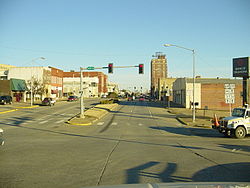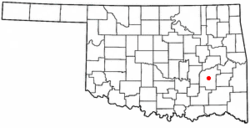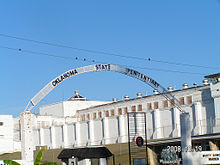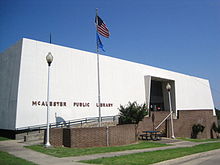- McAlester, Oklahoma
-
McAlester, Oklahoma — City — Downtown McAlester Location of McAlester, Oklahoma Coordinates: 34°55′59″N 95°45′59″W / 34.93306°N 95.76639°WCoordinates: 34°55′59″N 95°45′59″W / 34.93306°N 95.76639°W Country United States State Oklahoma County Pittsburg Area - Total 15.8 sq mi (41.0 km2) - Land 15.7 sq mi (40.6 km2) - Water 0.1 sq mi (0.4 km2) Elevation 735 ft (224 m) Population (2000) - Total 17,783 - Density 1,133.1/sq mi (437.5/km2) Time zone Central (CST) (UTC-6) - Summer (DST) CDT (UTC-5) ZIP codes 74501-74502 Area code(s) 539/918 FIPS code 40-44800[1] GNIS feature ID 1095202[2] McAlester is a city in Pittsburg County, Oklahoma, United States. The population was 17,783 at the 2000 census. It is the county seat of Pittsburg County.[3] It is currently the largest city in the Choctaw Nation of Oklahoma, followed by Durant.
The town gets its name from J.J. McAlester, who later became Lt. Governor of Oklahoma and was immortalized as a character in the novel True Grit, which was then made into feature films in 1969 and 2010.
McAlester is the home of the Oklahoma State Penitentiary, site of an "inside the walls" prison rodeo from which ESPN's SportsCenter once broadcast. Sometimes Oklahomans refer to the state prison simply as "Big Mac" or "McAlester," and the town is referenced in that manner in the opening pages of The Grapes of Wrath when Tom Joad is released from there. The prison was also the site of a 1973 riot that lasted for days and is generally regarded as one of the worst in American history.[4]
McAlester is also the home of many of the employees of the nearby McAlester Army Ammunition Plant. This facility makes essentially all of the bombs used by the United States military. In 1998 McAlester became the home of the Defense Ammunition Center (DAC) which moved from Savanna, Illinois and relocated as a tenant on McAlester Army Ammunition Plant.
McAlester is known in political circles for having been the home base of several noted American politicians - U.S. Speaker of the House Carl Albert, who was once a heartbeat from the presidency, and longtime Oklahoma State Senator Gene Stipe, whose career ended in a series of legal problems. Former Oklahoma Governor George Nigh and Oklahoma Supreme Court Chief Justice Steven W. Taylor also hail from McAlester. McAlester is still known in Oklahoma as the "Capital of Little Dixie," for its old-time Democratic politics.
Contents
History
The crossing of the east-west California Road with the north-south Texas Road formed a natural point of settlement in Tobucksy County of the Choctaw Nation. James Perry who emigrated from Mississippi to the Indian Territory first established a settlement at the intersection of the two roads in 1838. The town there was named after Perry by being called Perryville. At one time Perryville was the capitol of the Choctaw Nation and County Seat of Tobucksy County. During the War Between the States the Choctaw allied with the Confederate States of America (CSA) as the war reached Indian Territory [1] a depot providing supplies to Confederate Forces in Indian Territory was set up at Perryville. On August 26, 1863 a force of 4,500 Union soldiers crossed the Canadian River and destroyed the Confederate munitions depot at Perryville. This became known as the Battle of Perryville Indian Territory. Major General James G. Blunt (Union) finding the Confederate supplies and realizing that Perryville was a major supply depot for Confederate forces ordered the town burned. The town was rebuilt, but never reached its prewar glory or population.
After the end of the war and the surrender of General Stand Waite, Captain James Jackson McAlester obtained a job with the trading company of Reynolds and Hannaford. McAlester, an employee of licensed traders Reynolds and Hannaford convinced the firm to locate a general store at Tupelo in the Choctaw Nation. McAlester had learned of coal deposits in Indian Territory during the War Between the States while serving as a Captain with the 22nd Arkansas Volunteer Infantry (Confederate). At Fort Smith Arkansas before going to work with Reynolds and Hannaford McAlester had received maps of the coal deposits from engineer Oliver Weldon, who had served with McAlester during the war. Weldon had worked for the U.S. Geological Survey mapping Indian Territory before the war and knew of the rich coal deposits. Hearing of the railroad plans to extend through Indian Territory and knowing that rich deposits of coal were in an area north of the town of Perryville, McAlester convinced Reynolds and Hannaford that Bucklucksy would be a more suitable and profitable location for the trading post. McAlester constructed a trading post/general store at that location in late 1869 (Presley 1978, p. 72). The general store was an immediate success, but J. J. McAlester recognized an even greater opportunity in the abundance of coal deposits in the area, and he began obtaining rights to the coal deposits from the Choctaws anticipating the impending construction of a rail line through Indian Territory.
By virtue of having been the first to extend its line to the northern border of Indian Territory, the Union Pacific Railway Southern Branch earned right of way and a liberal bonus of land to extend the line to Texas. A number of New York businessmen, including Levi P. Morton, Levi Parsons, August Belmont, J. Pierpont Morgan, George Denison and John D. Rockefeller were interested in extending rail line through Indian Territory, and the Missouri-Kansas-Texas Railroad, familiarly called the Katy Railroad, began its corporate existence in 1865 toward that end. Morton and Parsons selected a site near the Kansas border with Indian Territory at which a town operated by the railroad could be located, with the settlement incorporated under the name of Parsons, Kansas, in 1871.
That same year, J.J. McAlester, after buying out Reynolds’ share of the trading post, journeyed with a sample of coal to the railroad town in hopes of persuading officials to locate the line near his store at Bucklucksy. The location of the trading post on the Texas Road weighed in its favor, given that the Katy Railroad line construction roughly followed the Shawnee Trail – Texas Road route southward to the Red River. The line reached Bucklucksy in 1872, and Katy Railroad officials named the railway stop McAlester (Nesbitt 1933, pp. 760–61). With the coming of the railroad, businesses in nearby Perryville began relocating to be near the McAlester Rail Depot, marking the end of Perryville and the beginning of McAlester. On August 22, 1872, J.J. McAlester married Rebecca Burney (born 1841 in Mississippi - died May 4, 1919, in Oklahoma). Rebecca was a member of the Chickasaw Nation and this made it possible for McAlester to gain citizenship and the right to own property in both the Choctaw and Chickasaw nations. This allowed McAlester to legally obtain his own mineral rights to the coal deposits. McAlester being a savvy businessman quickly obtained land near the intersection of the north-south and east-west rail line intersection. McAlester opened a second general store on this corner and was able to continue doing business sailing coal to the railroads.
Fritz Sittle (Sittel), a Choctaw citizen by marriage and one of the first settlers in the area, urged visiting newspaperman Edwin D. Chadick in 1885 to pursue the possibility of establishing an east-west rail line to run through the coal mining district at Krebs that would connect with the north-south line at McAlester. Chadick eventually found financing and established the Choctaw Coal and Railway in 1888, but was unable to come to terms with J.J. McAlester over the issue of right of way.
Chadick and his investors purchased land to the south of McAlester's General Store, and where the two rail lines crossed formed a natural trading crossroads, and quickly became a bustling community designated as South McAlester. The original town location became known familiarly as North McAlester or North Town although early U.S. Census records simply identified it as McAlester.
The two towns operated as somewhat separate communities until 1907, when the United States Congress passed an Act joining the two communities as a single municipality, the action being required since the towns were under Federal jurisdiction in Indian Territory. The separate entities of McAlester and South McAlester were combined under the single name McAlester with office-holders of South McAlester as officials of the single town. Designation as a single community by the United States Post Office came on July 1, 1907, nearly five months before Oklahoma Statehood, which caused a redrawing of county lines and designations and the majority of Tobucksy County fell within the new lines of Pittsburg County. J.J. McAlester was instrumental in starting the coal mining industry, telephone company, electrical company and other businesses in the town of McAlester.
McAlester was the site of the 2004 trial of Terry Nichols on Oklahoma state charges related to the Oklahoma City bombing (1995). On December 25, 2000 an ice storm hit the area leaving residence without electrical service and water for more than two weeks; in January 2007, a second devastating ice storm crippled the city, leaving residents without power and water for more than a week.
Neighboring Communities
- Savanna
- Tannehill
Transportation
- Arkansas and Oklahoma Railroad
- Indian Nation Turnpike
- Interstate 40
- McAlester Bus Station
- McAlester Regional Airport
- State Highway 1
- State Highway 9
- State Highway 31
- State Highway 71
- U.S. Highway 69 Business
- U.S. Highway 69
- U.S. Highway 75
- U.S. Highway 270
- U.S. Highway 271
(McAlester Chamber of Commerce 2007)
Economy
The Oklahoma State Penitentiary is a large source of employment and local revenue in McAlester.[5]
Demographics
As of the 2000 census,[1] there were 17,783 people, 6,584 households, and 4,187 families residing in the city. The population density was 1,133.1 people per square mile (437.6/km²). There were 7,374 housing units at an average density of 469.9 per square mile (181.5/km²). The racial makeup of the city was 74.72% White, 8.68% African American, 10.48% Native American, 0.39% Asian, 0.05% Pacific Islander, 1.29% from other races, and 4.38% from two or more races. Hispanic or Latino of any race were 3.04% of the population.
There were 6,584 households out of which 29.1% had children under the age of 18 living with them, 46.6% were married couples living together, 13.7% had a female householder with no husband present, and 36.4% were non-families. 33.7% of all households were made up of individuals and 16.6% had someone living alone who was 65 years of age or older. The average household size was 2.31 and the average family size was 2.93.
In the city the population was spread out with 22.2% under the age of 18, 8.7% from 18 to 24, 30.4% from 25 to 44, 20.8% from 45 to 64, and 18.0% who were 65 years of age or older. The median age was 38 years. For every 100 females there were 107.8 males. For every 100 females age 18 and over, there were 108.2 males.
The median income for a household in the city was $28,631, and the median income for a family was $36,480. Males had a median income of $29,502 versus $19,455 for females. The per capita income for the city was $16,694. About 16.1% of families and 19.4% of the population were below the poverty line, including 26.8% of those under age 18 and 11.6% of those age 65 or over.
Government and infrastructure
Two Oklahoma Department of Corrections facilities, the Oklahoma State Penitentiary and the Jackie Brannon Correctional Center, are in McAlester.[6][7]
Education
McAlester Public Schools operates public schools.
The McAlester Public Library is located in McAlester. The current library was built in 1970. As of 2010 the city has plans to build a new library.[8] The Friends of the McAlester Public Library is financing the new branch.[9]
Points of interest
- Garrard Ardeneum
- McAlester Public Schools
- McAlester Housing Authority
- McAlester News-Capital
- Oklahoma State Penitentiary
- Country Mart
Notable residents
- Carl Albert, Former Speaker of the U.S. House
- Wanda Bass, benefactor of the Oklahoma City University Wanda L. Bass School of Music
- Melva Blancett, Actress[10]
- John Berryman, Poet
- Riley Brett, Race Car Driver
- Edwin H. Burba, Jr., U.S. Army four star general
- Lynn Cartwright, Character Actress
- Wilburn Cartwright, Former U.S. Representative from Oklahoma
- W.H.H. Clayton, U.S. District Court Judge
- Bennie L. Davis, U.S. Air Force four star general
- Bob Dickson, Professional Golfer
- Clonie Gowen, Professional Poker Player
- Steve King, NFL football player
- Steven T. Kuykendall, Former U.S. Representative from California
- Pepper Martin, Major League Baseball Player
- J. J. McAlester, pioneer, for whom McAlester was named
- Pake McEntire, Country Singer
- Reba McEntire, Country Singer
- Susie McEntire-Eaton, Sister of Pake & Reba McEntire, Country/Gospel Singer
- Beverlee McKinsey, Soap Opera Actress
- George Nigh, Former two-term Oklahoma Governor
- Brian Shackelford, Major League Baseball Player
- Brandon Keith, NFL football player
- Solomon Hyatt Mackey, Final territorial judge at Tobucksy County, I.T. Courthouse in present day North Town, McAlester
- A. T. Powers, Missionary Baptist clergyman
- Boz Scaggs, musician
- Gene Stipe, longest-serving member of the Oklahoma Senate, represented McAlester (1957–2003)
- Steven W. Taylor, Oklahoma Supreme Court Chief Justice
- Edward Lloyd Thomas, Confederate General
- Wade Watts, Baptist Minister and Civil Rights Activist, Uncle of J.C. Watts
- Walter L. Weaver, Former U.S. Representative from Ohio
- Michael Wilson, Screenwriter
- Kindal "Kiki" Roberts, Adult film star, owner of the world's largest gerbil ranch.
- Luther McEuen, Famous Territorial and Federal Marshall
NRHP sites
The following sites in McAlester are listed on the National Register of Historic Places:
- Aldridge Hotel
- Busby Office Building
- Busby Theatre
- Federal Building and US Courthouse
- First Presbyterian Church
- Jeff Lee Park Bath House and Pool
- Mass Grave of the Mexican Miners
- McAlester Armory
- McAlester DX
- McAlester House
- McAlester Scottish Rite Temple
- Mine Rescue Station Building
- New State School
- OKLA Theater
- Perryville
- Pittsburg County Courthouse
Footnotes
- ^ a b "American FactFinder". United States Census Bureau. http://factfinder.census.gov. Retrieved 2008-01-31.
- ^ "US Board on Geographic Names". United States Geological Survey. 2007-10-25. http://geonames.usgs.gov. Retrieved 2008-01-31.
- ^ "Find a County". National Association of Counties. http://www.naco.org/Counties/Pages/FindACounty.aspx. Retrieved 2011-06-07.
- ^ McAlester Prison Riot
- ^ Shapiro, Dean M. "Kirksey." Crime Library. Retrieved on July 24, 2010.
- ^ "Oklahoma State Penitentiary." Oklahoma Department of Corrections. Retrieved on November 22, 2010.
- ^ "Jackie Brannon Correctional Center." Oklahoma Department of Corrections. Retrieved on November 22, 2010.
- ^ "Friends of the Library." McAlester Public Library. Retrieved on November 22, 2010.
- ^ "fol_brochure_thumb.jpg." McAlester Public Library. Retrieved on November 22, 2010.
- ^ "Melva Blancett obituary". McAlester News-Capital. 2010-03-11. http://www.mcalesternews.com/legacy_obits/local_story_070114051.html?keyword=secondarystory. Retrieved 2010-03-30.
References
- Nesbitt, Paul (1933), "J.J. McAlester", Chronicles of Oklahoma (Oklahoma City: Oklahoma Historical Society) 11 (2): 758–64, 1933-06, ISSN 0009-6024, OCLC 1554537, http://digital.library.okstate.edu/Chronicles/v011/v011p0758.html, retrieved 2007-08-16.
- Presley, Mrs. Leister E., ed. (1978), "Biography of J. T. Hannaford - Conway Co, AR", The Goodspeed biographical and historical memoirs of western Arkansas ; Yell, Pope, Johnson, Logan, Scott, Polk, Montgomery, and Conway counties, Easley, SC: Southern Historical Press (published June 1978), p. 72, ISBN 978-0893080846, ISSN 0893080845, OCLC 5729534, LCC: F411 .B67 1978, http://ftp.rootsweb.com/pub/usgenweb/ar/conway/bios/hannafordjt.txt.
- McAlester Chamber of Commerce (2007-09-01), Living In McAlester: Location/ Transportation, http://www.mcalester.org/custom2.asp?pageid=2075#A, retrieved 2007-09-01
- Dunbar, Trevor (January 14, 2007). "Ice storm". McAlester News-Capital. http://www.mcalesternews.com/homepage/local_story_014130843.html. Retrieved 2007-09-26.
External links
- McAlester Chamber of Commerce
- Community Profile
- McAlester Photos
- City of McAlester
- Map from Center for Spatial Analysis
Municipalities and communities of Pittsburg County, Oklahoma County seat: McAlester Cities Haileyville | Hartshorne | Krebs | McAlester
Towns CDP Unincorporated
communitiesGhost town Adamson
Categories:- Cities in Oklahoma
- Populated places in Pittsburg County, Oklahoma
- County seats in Oklahoma
- Micropolitan areas of Oklahoma
Wikimedia Foundation. 2010.





